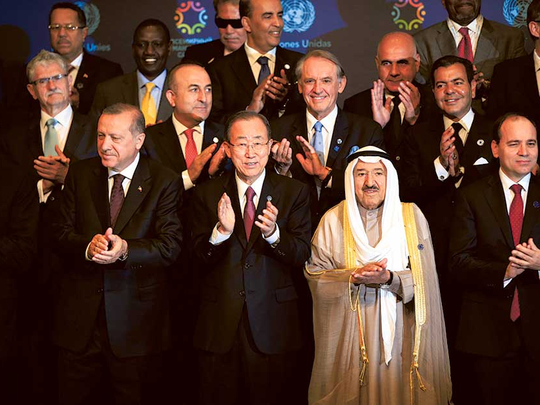
Istanbul: Turkish President Recep Tayyip Erdogan urged on Monday that the burden of responding to the world’s crises be more evenly shared, as leaders and aid groups gathered in Istanbul seeking to transform the global humanitarian aid system.
More than 60 heads of state and government gathered for the two-day summit convened by UN Secretary General Ban Ki-moon will have to defeat considerable scepticism that the event will turn into a well-intentioned but fruitless talking shop.
With some 60 million people displaced around the world and at least 125 million requiring assistance and protection in the biggest humanitarian crises since Second World War, Ban said that the summit represented a chance to forge a “different future”.
Actors perform during the opening ceremony of the World Humanitarian Summit against a backdrop picture of refugees. (Image Credit: AP)
“Let us seize this opportunity, let us make our mark as agents of change,” said Ban.
He warned that realising the aims was not “an easy task” and required a “political will on a scale we have not seen in recent years.”
The summit aims in particular at early warning prevention of conflicts as well as ensuring that humanitarian law is properly observed, amid alarm on attacks against schools and hospitals in the conflicts in Syria and Yemen.
Backdropped by a projected picture of refugees, actors perform during the opening ceremony of the summit. (Image Credit: AP)
Host Erdogan emphasised the contributions of his country, which is hosting some 3 million refugees from the Syria and Iraq conflicts and, in a barb at the West, complained others were not sharing the burden.
“The current system falls short... the burden is shouldered only by certain countries, everyone should assume responsibility from now on,” he said.
“Needs increase every day but resources do not increase at the same pace. There are tendencies to avoid responsibility among the international community.”
“Turkey knows this bitterly,” he added, saying Turkey had spent $10 billion (Dh36.7 billion) on its hosting of Syrian refugees compared to $450 million from the rest of the international community.
Reprising a familiar theme, Erdogan also urged reform of the UN Security Council, saying the “fate of humanity” cannot depend on its five veto-wielding permanent members.
German Chancellor Angela Merkel, one of the hightest profile guests at the summit, called for an end to empty pledges on aid that fizzled into nothing.
“Too many promises are made and then the money does not come for the projects - that must end,” said Merkel, adding that the world currently had no humanitarian system that was “compatible with the future”.
The commitments adopted by the states will be non-binding and while leaders like Merkel and Kuwaiti Emir Shaikh Sabah Al Ahmad Al Sabah are attending the summit many other prominent world leaders are conspicuous by their absence.
The summit began with the traditional family photograph and a glitzy opening ceremony including celebrities such as James Bond star Daniel Craig who is a UN advocate for eliminating mines.
“This summit is about potential to start the biggest humanitarian movement in our history,” Craig said in an emotional speech, warning against “empty words without action.”
Pope message
Pope Francis, who was to give a video message to the summit, said on Sunday he was praying that the participants of the summit “work to save the life of every human being, without any exception, in particular the innocents and the most vulnerable”.
The summit is the result of years of planning but there has been criticism that its actual outcomes could fall well short of its lofty ambitions.
Medical charity Doctors Without Borders (MSF) is boycotting the event, saying it risked being just a “fig leaf” for the world’s failure on humanitarian action.
“I regret very much that they came to that decision,” said UN Deputy Secretary General Jan Eliasson.
“One of the main purposes of this conference is our outrage against violations of international humanitarian law,” adding he hoped the “convictions they (MSF) stand for” would come out of the meeting.
In a move applauded by the UN, dozens of nations taking part in the summit issued a joint statement supporting the meeting’s aims, pledging to do more to tackle the underlying causes of conflict.












